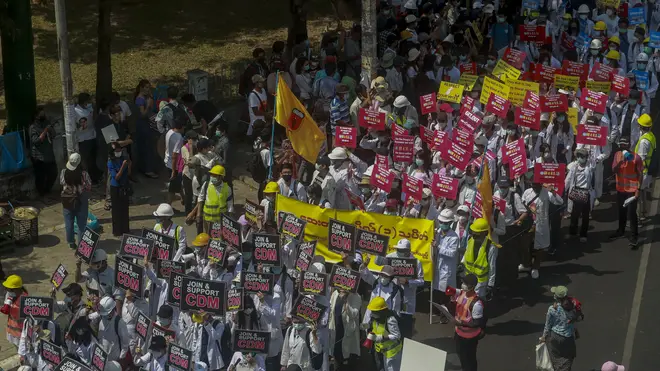
Nick Abbot 10pm - 1am
25 February 2021, 13:44

Large daily demonstrations have been calling for Aung San Suu Kyi’s government to be restored to power.
Supporters of Myanmar’s junta have attacked protesters demanding the end to the military government that took power in a coup.
They used slingshots, iron rods and knives to injure several of the demonstrators.
The violence complicates an already intractable stand-off between the military and a protest movement that has been staging large rallies daily to demand that Aung San Suu Kyi’s elected government be restored to power.
She and other politicians were ousted and arrested on February 1 in a takeover that shocked the international community and reversed years of slow progress towards democracy.
Facebook, meanwhile, announced that it would ban all accounts linked to the country’s military as well as ads from military-controlled companies – a reflection of international outrage over the takeover.

Tensions escalated on the streets between anti-coup protesters and supporters of the military on Thursday. Photos and videos posted on social media showed groups attacking people in downtown Yangon as police stood by without intervening.
According to accounts and photos posted on social media, hundreds of people marched on Thursday in support of the coup.
When the marchers were jeered by bystanders near the city’s central railway station, they responded by firing slingshots, throwing stones and then chasing down the bystanders. One band that broke away stabbed and kicked a man they had chased. Video shows there had been both pro- and anti-coup crowds near the station.
Supporters of the military have gathered in the streets before, especially in the days immediately before and after the coup, but had not used violence so openly.
Critics of the military claim it pays people to engage in violence, allegations that are hard to verify. They have been raised during earlier spells of unrest, including a failed anti-military uprising in 1988 and an ambush of Ms Suu Kyi’s motorcade in a remote rural area in 2003, when she was seeking to rally her supporters against the military regime then in power.
Such confrontations could make it harder to resolve Myanmar’s crisis.

Indonesian foreign minister Retno Marsudi visited the Thai capital, Bangkok, on Wednesday and held talks with her Thai counterpart Don Pramudwinai and Myanmar’s new foreign minister, retired army colonel Wunna Maung Lwin. The meeting was part of Ms Marsudi’s efforts to co-ordinate a regional response to the crisis in Myanmar.
“We asked all parties to exercise restraint and not use violence… to avoid casualties and bloodshed,” Ms Marsudi said in a virtual news conference after her return to Indonesia.
Ms Marsudi’s efforts echo those of the Association of Southeast Asian Nations, which has urged Myanmar’s military to make some concessions to help ease tensions. The 10-country regional grouping views dialogue with the generals as a more effective method of achieving compromise than more confrontational methods, such as the sanctions often advocated by Western nations.
Several countries have levied or are considering new sanctions against the military junta, and Facebook announced it, too, was taking action.
It said in a statement that it considered the situation in Myanmar an “emergency”, explaining that the ban on accounts linked to the military was triggered by events since the coup, including “deadly violence”.
The military says it took power because last November’s election was marked by widespread voting irregularities, an assertion that was refuted by the state election commission, whose members have since been replaced.
The junta has said it will rule for a year and then hold fresh elections.